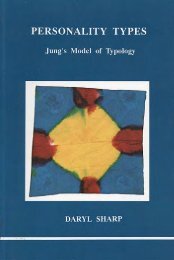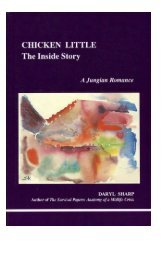Digesting Jung: Food for the Journey - Inner City Books
Digesting Jung: Food for the Journey - Inner City Books
Digesting Jung: Food for the Journey - Inner City Books
Create successful ePaper yourself
Turn your PDF publications into a flip-book with our unique Google optimized e-Paper software.
76 Dream On<br />
<strong>the</strong> buildings, from one side to <strong>the</strong> o<strong>the</strong>r. It keeps getting away from<br />
me; I cannot not pin it down.<br />
I woke up in a cold sweat, terrified, sobbing uncontrollably.<br />
From this distance it seems quite innocuous. At <strong>the</strong> time it blew my<br />
world apart. And I have seldom had a dreamless night since.<br />
It was my introduction to <strong>the</strong> reality of <strong>the</strong> psyche—a baptism by<br />
fire. I did not know that something could be going on in me without<br />
my being aware of it. I believed that will power could accomplish<br />
anything. “Where <strong>the</strong>re’s a will <strong>the</strong>re’s a way.” My bouncing ball<br />
dream came in <strong>the</strong> midst of a mighty conflict which I had a will to<br />
solve but no way. I kept thinking I could deal with it by myself. My<br />
reaction to <strong>the</strong> dream killed that illusion.<br />
<strong>Jung</strong> describes dreams as independent, spontaneous manifestations<br />
of <strong>the</strong> unconscious, self-portraits, symbolic statements of what<br />
is going on in <strong>the</strong> psyche. Although <strong>the</strong>y are not more important<br />
than what goes on during <strong>the</strong> day, <strong>the</strong>y are helpful comments from<br />
<strong>the</strong> unconscious on our outer life.<br />
Freud’s view was that dreams have a wish-fulfilling and sleeppreserving<br />
function. <strong>Jung</strong> acknowledged this to be true in some<br />
cases but focused on <strong>the</strong> role dreams play in <strong>the</strong> self-regulation of<br />
<strong>the</strong> psyche. He suggested that <strong>the</strong>ir main function was to compensate<br />
conscious attitudes—to call attention to different points of<br />
view—in order to produce an adjustment in <strong>the</strong> ego-personality.<br />
Compensation is a process aimed at establishing or maintaining<br />
balance in <strong>the</strong> psyche. If <strong>the</strong> conscious attitude is too one-sided, <strong>the</strong><br />
dream takes <strong>the</strong> opposite tack; if <strong>the</strong> conscious attitude is more or<br />
less appropriate, <strong>the</strong> dream seems satisfied with pointing out minor<br />
variations; and if <strong>the</strong> conscious attitude is entirely adequate, <strong>the</strong>n<br />
<strong>the</strong> dream may even coincide with and support it.<br />
<strong>Jung</strong> also emphasized <strong>the</strong> prospective function of dreams, which<br />
means that in many cases <strong>the</strong>ir symbolic content outlines <strong>the</strong> solution<br />
of a conscious conflict. This is in line with his view of neurosis<br />
as purposeful: <strong>the</strong> aim of dreams is to present to consciousness <strong>the</strong><br />
in<strong>for</strong>mation needed to restore <strong>the</strong> psyche to a healthy balance.










